Research
Major Project Involvement
Applications Accepted (FY2024)
| No. of applications accepted | Amount (in thousands of yen) |
| 35 | 5,253,816 |
*Large-scale projects: a project holds research budget 20 million yen a year or more.
Japan Science and Technology Agency (JST) ASPIRE
Network of Software Studies towards Social Trust in Information Technologies
While information technology has made remarkable progress in recent years, safety assurance technologies remain underdeveloped (as evidenced by the absence of international safety standards for autonomous driving), which is hindering the social acceptance of new information technologies. This research is based on the field of software sciences, which has traditionally been responsible for ensuring the safety of information technology. It solves two academic difficulties faced in the field in respect of new information technology; namely, (1) the fragmentation of the research community and (2) the inclusion of physical and statistical elements. In Japan, there have been a number of world-first achievements for overcoming these two difficulties. Under this leadership, the project will build an international network for transforming software science together with leading groups from Germany, the Netherlands, and the UK. Through a system centered on young researchers that also includes outstanding senior researchers, it will link individual results achieved through interactions among young researchers to a major academic movement. It will also work to achieve multifaceted (non-linear) cooperation through a four-hub system. The academic results of this research will be linked with social and industrial applications, such as international standards, serving as the basis for establishing social trust in new information technologies and realizing a true information-oriented society.

JST ASPIRE
Advanced Research on Discrete Math, Graph Algorithm and Graph Theory
In Japan, not only are there very few examples of theoretical researchers contributing to Japanese companies, but there are also few examples of theoretical researchers active in their field. For instance, only a small percentage of papers written by Japanese researchers are accepted at leading international conferences in the informatics field. To promote innovation on the level of major IT companies, human resources familiar with math theory must work to tackle social problems. Against this backdrop, the ERATO Kawarabayashi Large Graph Project (2012-2018) has provided society with human resources capable of fully utilizing math theory. Moreover, by applying this theory to various fields within informatics, the project has also contributed to improving the status of the foundational IT research field in Japan. Furthermore, the project has achieved research results that are driving the field of algorithms on a global scale, which includes receiving the Best Paper Award at SODA2013, SODA2015, FOCS2015, and STOC2017, leading international conferences in this field focusing mainly on theoretical (mathematical) analysis. ASPIRE aims to further strengthen research activities, disseminating world-class research results in the fields of algorithms and discrete math in particular, as well as to establish a global hub for algorithm and discrete math research. In addition, through joint research with overseas researchers, it also strives to conduct research exchanges between postdoctoral (PD) and graduate researchers, thereby increasing the visibility of research on discrete math, graph algorithms, and graph theory in Asia and Europe.

JST AIP Acceleration Research
Acceleration and Dissemination of Social Implementation of Fake Media Detection Technologies
The issue of using deep generative models to learn human faces and voices, etc. and synthesize images and voices that are indistinguishable from the real thing, then using this for fraudulent purposes is referred to in society as "deepfakes," and there is a current need for countermeasures against such practices worldwide. To address this issue, the National Institute of Informatics in Japan, and Avignon University and research center EURECOM in France conducted the research project VoicePersonae: Voice Identity Cloning and Protection (Japan-France Joint Proposal) between fiscal 2018 and fiscal 2023, achieving pioneering research results in the field of deepfake detection in videos and audio. Moreover, in order to enable Japanese companies to use these research results, the project also developed a comprehensive deepfake video detection tool called SYNTHETIQ VISION, and has also given these research results back to society.
Meanwhile, given the rapid spread of commercial-use services for image generation, such as Stable Diffusion, and voice cloning, as well as the emergence of multiple reports of misuse, research into technologies to deal with the misuse of AI-generated fake media also needs to be rapidly scaled up from experiments by individual labs to technologies applicable in actual society. These should also be made available as technologies for addressing ongoing social issues. Accordingly, this AIP Acceleration Research has involved integrating results from the multiple fake media countermeasure technologies that have been researched in the above-mentioned CREST project and making fake media countermeasure technologies available to even more Japanese companies. At the same time, we are conducting research and development on developing more advanced technologies and insufficient technologies with a view to deploying them in actual society. Specifically, research and development is currently being conducted under the main topics of "fake media detection technology for multimedia," "advancement of machine learning to trace faking," and "development of an active defense for voice and video."

JST CRONOS
Inclusive Robotic Foundation Model with Unstandardized Data
When collecting data to train AI, the data is generally organized by input/output size, data type, and other standards. Standardization of this data is also common in the robotics field. For example, the Robot Operating System (ROS), which is useful for linking multiple robots, sensors, and actuators, requires that the format of observation and command data be determined and shared in advance. Robotic foundation models have been attracting attention in recent years. For such models, in order to absorb the physical differences of each robot when collecting large amounts of data from multiple robots for training, standards for input and output data are aligned, with input set as images and language, and output set as the amount of movement of a robot's hand position. While data standardization facilitates the development of robotic systems, it discards a lot of data that does not fit into these standards. In particular, simply put, the sensors and configurations of degree of freedom that robots possess are extremely diverse, and standardizing these will force the use of only very limited commonalities. No matter how much data is collected, current policies premised on standardization will not elicit the full potential of diverse robots. Accordingly, this research attempts to develop the inclusive robotic foundation model, a data processing and training foundation that can be deployed for diverse robots while eliciting the capabilities of each robot with non-standardized transmitted and collected data. Various experts will develop elemental technologies for absorbing differences due to non-standardization, with a particular focus on the four individualities that should be prioritized for non-standardization: modality, embodiment, motion commands, and teaching methods. We will build an inclusive robotic foundation model by integrating these technologies, and the free sharing of data by many researchers, universities, and companies with unique robots will accelerate the realization of AI robots that utilize this data and their implementation in society.

JST Key and Advanced Technology R&D through Cross Community Collaboration Program
Realization of an Infrastructure Operator Support System that Ensures Resilience Against Cyberattacks
Cyberattacks are becoming more sophisticated day by day, and even organizations with cybersecurity experts may not notice attacks eroding systems behind the scenes until the damage is already apparent. Furthermore, conventional responses to information incidents have typically included the steps of implementing an emergency shutdown of the system after damage has been confirmed, investigating the cause, taking measures to prevent recurrence, then resuming operations.
On the other hand, considering the physical phenomena and chemical reactions handled by many infrastructure operations, an instantaneous shutdown would be impossible, even after the occurrence of damage and the consequent emergency shutdown of control systems. In fact, losing control of the infrastructure due to an emergency shutdown could lead to a serious incident. Control must therefore continue until the infrastructure has been stably shutdown. In infrastructure operations, it is essential not only to have the defensive capabilities to block attacks, but also to ensure resilience for maintaining essential functions necessary for service continuity even while responding to attacks. Accordingly, for medical institutions, which are operators of critical infrastructure, the project will develop a method for estimating the impact and risk that medical services would incur from cyberattacks by identifying the existence of attacks on medical information networks, determining the intentionality of the attacks, and specifying the scope of damage. Based on the estimations, the project will develop a method to support the operation of critical infrastructure, which would include specifying important medical equipment that has a significant impact on nursing care and checking for data contamination, maintaining medical services by neutralizing contaminated data, and presenting alternative measures to medical practitioners when the continuation of operations is deemed to be difficult. The project has a five-year plan to achieve these goals with the collaboration of researchers in information security management, information management, network management, and medical information from NII as the lead institution and Kyoto University, the University of Osaka, Kyushu University, and Juntendo University.

JST Fusion Oriented REsearch for disruptive Science and Technology
Creation of Functional and Developmental Evaluation Foundation for Linguistic Intelligence
In the field of natural language processing, the goal is to build systems that understand language like humans do, with natural language understanding benchmarks having been used to evaluate such systems. In recent years, large language models (LLMs) have shown a higher level of accuracy than existing systems. However, the issue is that their evaluations have a low level of explainability. This research addresses the three issues in evaluating language understanding systems. First, it has been pointed out that current models exhibit incomplete logical, social, and cognitive functional abilities, and so it is necessary to design evaluation tasks for real-world language use. This involves enhancing evaluation of logical understanding of complex arguments and common sense reasoning in particular.
Second, there is a gap between the language acquisition processes of humans and models, and no methods have been established for efficiently acquiring the intended abilities. Models show different behavior from humans in problem solving and pragmatic reasoning using biases, which requires a developmental and gradual evaluation of learning. Moreover, as current language models are inefficient in terms of computing resources, it is also necessary to examine learning principles that take into account other modal information in the same way as language acquisition in humans. Third, there is a lack of evaluation methods for improving the suitability of benchmarks, and appropriate task sets and evaluation indicators are unclear.
In addition, the reliability of methods that use more powerful models to evaluate model outputs has also not been fully examined. The purpose of this research is to build a foundation for evaluating advanced, human-like language understanding systems through the evaluation of functional abilities, establishment of developmental evaluation methods, and provision of psychometric evaluation methods. In doing so, the project will explore language understanding by both humans and systems with the aim of efficiently building systems with reliable real-world applications and intended abilities, and establishing highly explainable evaluation methods.


 NII Today No.105(EN)
NII Today No.105(EN) Overview of NII 2025
Overview of NII 2025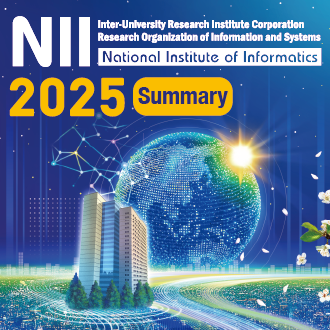 Summary of NII 2024
Summary of NII 2024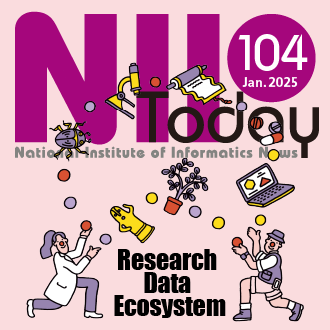 NII Today No.104(EN)
NII Today No.104(EN) NII Today No.103(EN)
NII Today No.103(EN)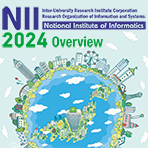 Overview of NII 2024
Overview of NII 2024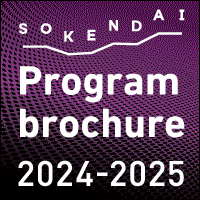 Guidance of Informatics Program, SOKENDAI 24-25
Guidance of Informatics Program, SOKENDAI 24-25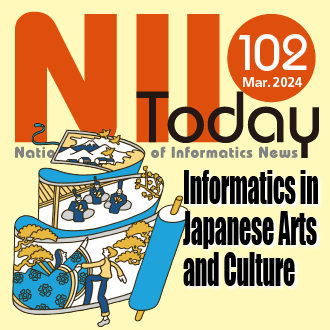 NII Today No.102(EN)
NII Today No.102(EN) SINETStream Use Case: Mobile Animal Laboratory [Bio-Innovation Research Center, Tokushima Univ.]
SINETStream Use Case: Mobile Animal Laboratory [Bio-Innovation Research Center, Tokushima Univ.] The National Institute of Information Basic Principles of Respect for LGBTQ
The National Institute of Information Basic Principles of Respect for LGBTQ DAAD
DAAD
